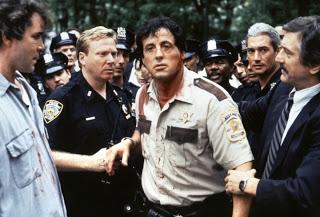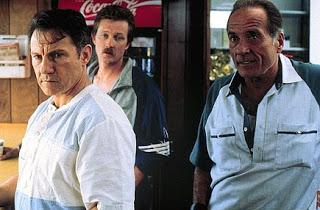 Sylvester Stallone earned some of his best reviews for Cop Land (1997), James Mangold's overachieving crime drama. Despite Stallone and a high-caliber supporting cast, the movie's wildly unbalanced.
Sylvester Stallone earned some of his best reviews for Cop Land (1997), James Mangold's overachieving crime drama. Despite Stallone and a high-caliber supporting cast, the movie's wildly unbalanced. Garrison, New Jersey is an idyllic suburb populated by New York policemen. Presiding is Sheriff Freddy Heflin (Sylvester Stallone), a wannabe with a bad ear who idolizes the police. Then Officer Murray Babitch (Michael Rapaport) shoots two teenagers and seemingly kills himself in a murky incident. Heflin reluctantly gets involved after discovering that his longtime friend, Lieutenant Ray Donlan (Harvey Keitel), leads a coterie of crooked cops who will do anything to cover themselves.
Cop Land is a well-made film, with the raw style and violence of a Michael Mann film. Mangold effectively contrasts the grimy city with Garrison's seeming idyll, violent men retiring into seemingly normal life. There's a sharp racial charge to the proceedings: Babitch's victims are black, and Heflin's deputies harass a black couple visiting Garrison. Compared to Ray's crooks, Heflin's a saint: an act of teenaged heroism prevented his becoming a cop, yet also preserved his purity. Naturally, his conflict's to decide between friendship and justice.
Sylvester Stallone commits to his role, packing on weight and sloughing off his mannerisms. It's a surprisingly low-key performance, Stallone underplaying Heflin's quiet despair and incomprehension. Hopelessly out of his depth, he's only got a damaged moral compass and personal regrets driving him. Stallone deserves credit for his subdued work; many stars trying to prove themselves go the ham route. By underplaying, Sly goes toe-to-toe with heavyweights like Harvey Keitel, Robert De Niro and Ray Liotta without breaking a sweat.
 Problem is, Mangold can't decide if he's making Serpico or Our Town. Cop Land's overstuffed with sidetracks and subplots: characters have extramarital affairs and squabble with each other without making impact. Heflin's romance with Liz (Annabella Sciorra), wife of an NYPD cop (Peter Berg), is lost among a million other details. The plot hinges on Ray's bungled efforts to hide or kill Babitch, which are too cartoonish to take seriously. Why drown Babitch in a pool rather than shoot him? Are these guys evil, superefficient crooks or Watergate burglars?
Problem is, Mangold can't decide if he's making Serpico or Our Town. Cop Land's overstuffed with sidetracks and subplots: characters have extramarital affairs and squabble with each other without making impact. Heflin's romance with Liz (Annabella Sciorra), wife of an NYPD cop (Peter Berg), is lost among a million other details. The plot hinges on Ray's bungled efforts to hide or kill Babitch, which are too cartoonish to take seriously. Why drown Babitch in a pool rather than shoot him? Are these guys evil, superefficient crooks or Watergate burglars? Additionally, the supporting cast is so diluted, no one makes much impact, save Harvey Keitel's feral ringleader. Robert De Niro's Internal Affairs cop sulks and swears, berating Heflin for not getting involved, then for getting involved too late. Ray Liotta plays Figgsy, a troubled cop whose house suspiciously burns down in a long, tedious subplot. Janeane Garofalo's deputy endures sexism throughout the film; rather than prove her worth, she runs away. John Spencer and Edie Falco barely have dialog. With so many underdeveloped plot strands, Cop Land collapses under its own weight.
Cop Land's last third replaces farrago with cliché, as Heflin reenacts High Noon. His deputies abandon him, Figgsy skips town, even IA blows him off. Eventually, Heflin faces off against Ray's goons with a shotgun and ruptured eardrum, effectively staged by Mangold virtually without sound. It's well-done, until a side character makes an astoundingly convenient reappearance to save the day. Cop Land's so sloppy it can't even land the ending.
Somewhere within Cop Land's overstuffed plot lies a really great crime drama. Mangold makes confuses clutter with depth, sprawl with scope. He made the same mistakes ten years later, remaking 3:10 to Yuma with identical narrative excess. Pity the filmmaker who never learns cinematic discipline.

